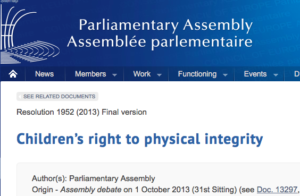Europe adopts historic resolution on children’s right to physical integrity!
The Council of Europe is an an international organization which focuses on promoting human rights, democracy, and the rule of law in Europe, and is comprised of 47 member nations. On October 1st, 2013, it adopted a resolution on the protection of children’s rights to physical integrity which included intersex people.

The Council of Europe’s Resolution 1952, “Childen’s right to physical integrity”, examines the issue of physical integrity for children of all sexes, based on protecting the rights of the child.
Section 2 reads:
2. The Parliamentary Assembly is particularly worried about a category of violation of the physical integrity of children, which supporters of the procedures tend to present as beneficial to the children themselves despite clear evidence to the contrary. This includes, amongst others, female genital mutilation, the circumcision of young boys for religious reasons, early childhood medical interventions in the case of intersexual children and the submission to or coercion of children into piercings, tattoos or plastic surgery.
In addition, in section 7.5.itcalls on all member states to “take the following measures with regard to specific categories of violation of children’s physical integrity:
7.5.1. publicly condemn the most harmful practices, such as female genital mutilation, and pass legislation banning these, thus providing public authorities with the mechanisms to prevent and effectively fight these practices, including through the application of extraterritorial “legislative or other measures to establish jurisdiction” for cases where nationals are submitted to female genital mutilation abroad, as specified in Article 44 of the Council of Europe Convention on Preventing and Combating Violence against Women and Domestic Violence (CETS No. 210);
7.5.2. clearly define the medical, sanitary and other conditions to be ensured for practices which are today widely carried out in certain religious communities, such as the non-medically justified circumcision of young boys;
7.5.3. undertake further research to increase knowledge about the specific situation of intersex people, ensure that no-one is subjected to unnecessary medical or surgical treatment that is cosmetic rather than vital for health during infancy or childhood, guarantee bodily integrity, autonomy and self-determination to persons concerned, and provide families with intersex children with adequate counselling and support;”.
We note that Section 7.5.3, about intersex people, was added after consultation that included consultation with OII Europe, ILGA-Europe and Genital Autonomy, and we thank and commend these colleagues for their work to ensure the inclusion of intersex people in this resolution!
More information:
- Resolution 1952, full text.
- Written statement by the Council of Europe, and link to video of the debate
- Genital Autonomy’s Helsinki Declaration (2012)
- Joint ILGA-Europe and OII Europe press release (OII Europe website)
- Joint ILGA-Europe and OII Europe press release (ILGA website)
